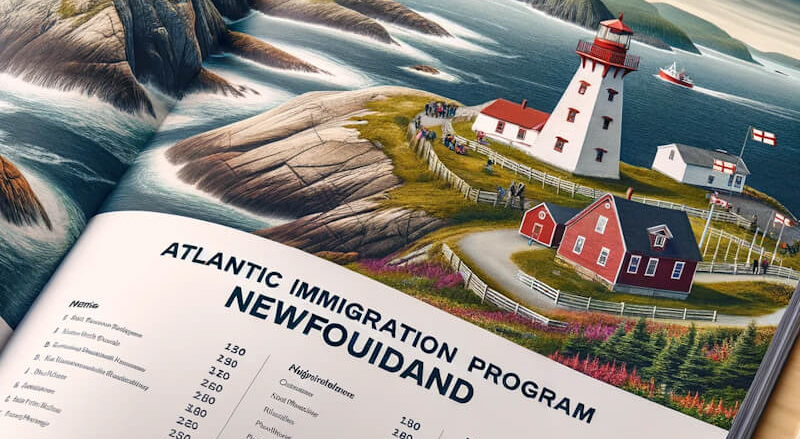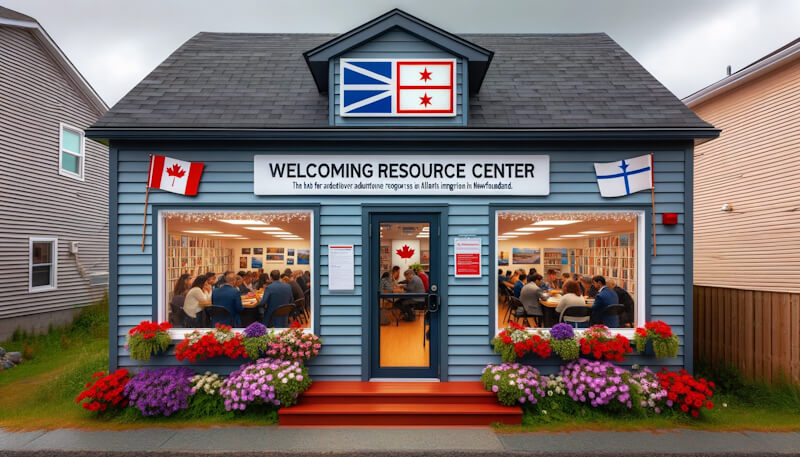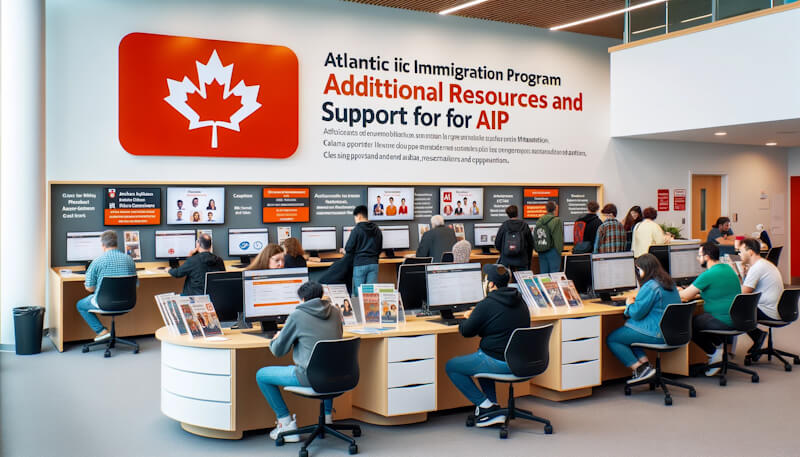How Atlantic Immigration Program Newfoundland Works?
Your Quick 30-Second Answer!
The Atlantic Immigration Program Newfoundland and Labrador is a pathway for skilled foreign workers and international graduates to gain permanent residence in Canada's Atlantic provinces, including Newfoundland and Labrador. This program is designed to address local labor shortages and helps employers in the province to hire qualified candidates who have not been able to find locally. Key elements include having a job offer from a designated employer in Newfoundland and Labrador, meeting work experience, education, language proficiency, and financial stability requirements. For the most accurate and current information, consult the official Canadian immigration website and the Government of Newfoundland and Labrador's Office of Immigration and Multiculturalism
For an in-depth overview, please see the "Table of Contents" below.
Learn all about Atlantic Immigration Program Newfoundland!
Welcome to this easy-to-follow guide on the Atlantic Immigration Program Newfoundland (AIP).
Table of Content
Basic Overview
1. Who should use this Guide?
2. Overview: A Quick Look
3. What is this Program and its Purpose?
4. How does this Program Operate?
Eligibility and Requirements
5. Who's the Ideal Candidate?
6. Eligibility criteria: What are they?
Application Process
7. Steps to apply for the program
8. Understand the Application Process
9. Essential Documents Needed.
10. Timeframes & Associated Costs
Tips and Best Practices
11. Do's and Don'ts for the Application
12. Expert Application Insights
13. Case Study: A look at a Fictional Example
FAQs and Additional Resources
14. Frequently Asked Questions
15. Helpful Resources: Where to look?

1. Who is This Guide Meant For?
This guide simplifies Atlantic Immigration Program Newfoundland (AIP) without getting lost in complicated language and rules. It’ll take all the confusing stuff and make it super easy to understand. Plus, it's packed with insider secrets to help you shine brighter than the rest when you apply! Primarily, this guide is for anyone who wants to learn about immigration to Canada through the Atlantic Immigration Program. If you find the official rules and documents about the requirements to move to Canada confusing, this guide can be your helpful friend. It’s here to give you clear and easy help so you can understand how Canadian permanent residence works without any problem.
The Atlantic Immigration Program is vital for skilled foreign workers and international graduates aiming for permanent residence in Newfoundland and Labrador. This program, part of Canada's strategy to fill job vacancies in the Atlantic provinces, links employers with international talent. Key aspects include:
- Designated Employers: Employers in Newfoundland and Labrador must be designated to offer jobs.
- Candidate Requirements: Candidates should meet criteria related to work experience, education, language proficiency, and financial stability.
- Permanent Residence: A pathway for candidates to settle in Newfoundland and Labrador.
For detailed and up-to-date information, refer to the official websites of the Government of
The Atlantic Immigration Program is vital for skilled foreign workers and international graduates aiming for permanent residence in Newfoundland and Labrador. This program, part of Canada's strategy to fill job vacancies in the Atlantic provinces, links employers with international talent. Key aspects include:
- Designated Employers: Employers in Newfoundland and Labrador must be designated to offer jobs.
- Candidate Requirements: Candidates should meet criteria related to work experience, education, language proficiency, and financial stability.
- Permanent Residence: A pathway for candidates to settle in Newfoundland and Labrador.
2. A Quick Overview of this Program.
The Atlantic Immigration Program Newfoundland is part of the bigger Atlantic Immigration Program (AIP), which serves four Atlantic provinces: Newfoundland and Labrador, New Brunswick, Nova Scotia, and Prince Edward Island.

What is This Program About?
The Atlantic Immigration Program Newfoundland is an employer-driven initiative by the Government of Canada, aimed at addressing labour market needs in Newfoundland & Labrador and supporting population growth in the Atlantic Canada region. It forms part of the broader Atlantic Growth Strategy and is distinct from Labrador’s Provincial Nominee Program.
This program allows businesses in the region, to hire skilled foreign workers and international students as a solution to local job vacancies. It's designed for prospective immigrants who have a valid job offer from a Newfoundland & Labrador employer. This full-time job offer is a crucial element, ensuring that the employment needs of the province are met and contributing to the successful development of the local economy.
Foreign nationals, including international graduates from a post-secondary institution in Canada, can apply under this program. They are required to have a valid work permit, and their field of study should align with the province's labour market needs. Full-time students can transition through the Post-Graduate Work Permit, and business owners can explore options like the International Entrepreneur Category.
The program considers principal applicants and their families for permanent resident status, aiming to transition skilled workers from temporary work permits to permanent residents. This long-term vision aligns with the federal government's overall immigration strategy.
Applicants must submit a settlement plan, facilitated by a designated settlement service provider organization. This plan includes a needs assessment to ensure settlement support for the new life awaiting in Newfoundland & Labrador.
For the International Graduate Category, graduates from a Canadian post-secondary institution in Newfoundland & Labrador, who hold a job offer related to their field of study, can apply. This also applies to skilled workers under the Skilled Worker Category, where a Labour Market Impact Assessment (LMIA) may be required.
The Newfoundland & Labrador employer plays a key role in this process. They must demonstrate the necessity of hiring foreign nationals and how this aligns with provincial nominee programs. The Office of Immigration, in collaboration with Citizenship Canada, oversees the program, ensuring a collaborative approach in meeting the province's skilled workforce requirements.
The program has eligibility requirements for both employers and employees, emphasizing an employer-driven approach. The application fee for the program is set by the federal government, part of a larger federal immigration program strategy.
In short, the Atlantic Immigration Program Newfoundland represents a comprehensive, collaborative approach to addressing the unique employment and demographic challenges of Newfoundland & Labrador, part of the larger effort to stimulate growth in Atlantic Canada. It is an employer-driven program, effectively addresses the needs of the Island of Newfoundland by filling job vacancies with qualified skilled workers. This innovative approach not only facilitates the transition of foreign nationals from temporary work permit to Canadian citizens but also integrates them into the Canadian workforce as permanent residents. Full-time students and participants of the Labrador Provincial Nominee Program also find opportunities through this permanent program, emphasizing the province's commitment to a diverse and robust workforce. Ultimately, this strategy ensures that the provincial nomination process aligns with the broader goals of enriching the local community and fostering long-term economic growth.
Who Can Apply? (Qualifications)
The AIP (Atlantic Immigration Program) is set up to get skilled workers and recent graduates to the Atlantic areas of Canada. Within the AIP, there are three main paths or "streams":
- the Atlantic High-Skilled Program (AHSP - for high-level jobs),
- the Atlantic International Graduate Program (AIGP - for recent grads), and
- the Atlantic Intermediate-Skilled Program (AISP - for mid-level jobs).
How Do I Apply?
- Step 1: Choose the Right Stream (Pick AHSP, AIGP, or AISP)
- Step 2: Get All Your Papers Together (Collect Important Documents)
- Step 3: Fill Out the Important Forms (Complete Application Papers)
- Step 4: Send Everything & Pay the Money (Submit and Pay the Fee)
- Step 5: Wait for the Answer (Wait for the Decision)
Once I'm Approved, What Happens?
After you get the thumbs up (approval) from the Atlantic Immigration Program Newfoundland, you can move to the Atlantic provinces. You'll be ready to start your job or studies and become part of the Canadian Atlantic community.
3. What is this Program and Why Does it Exist?
What's the Program About?
The Atlantic Immigration Program Newfoundland is a partnership between Canada's main government and the Atlantic provinces. Its goal is simple: invite and keep skilled people in areas like Newfoundland and Labrador, New Brunswick, Nova Scotia, and Prince Edward Island. This is under a larger program called the Atlantic Immigration Program (AIP). The main idea? There are job openings in the Atlantic provinces, and they're looking for the right overseas talents to fill them.
Why Does This Program Exist?
Purpose: Some parts of Atlantic Canada have jobs that need special skills. This program helps find people from other countries who have those skills and want to work and live here.
How It Works: The AIP offers three different routes or "streams" for applicants. They are:
1. Atlantic High-Skilled Program (jobs with special requirements): Think of roles that need unique expertise.
2. Atlantic International Graduate Program (recently graduated individuals): This is for those who've just completed their studies in an educational institution.
3. Atlantic Intermediate-Skilled Program (specific job roles): Jobs that require certain experience.
Each "stream" has its rules or criteria about things like work experience and language abilities. The good news? Local employers and groups that help newcomers, known as settlement service organizations, are there to guide applicants from the beginning to the end.
To wrap it up, The Atlantic Immigration Program Newfoundland is a welcoming hand for skilled individuals from other countries to come, work, and settle in the Atlantic regions of Canada.
4. How Does this Program Work?
Understanding the Process
Step 1 - Getting Chosen: Think of companies in areas like Newfoundland and Labrador, New Brunswick, Nova Scotia, and Prince Edward Island as employers at a large job fair. If they believe you have the skills they're looking for, they'll select you and then show you the steps to follow.
Step 2 - Supportive Guidance: Once chosen, you're not left to figure things out alone. These companies, along with certain support groups, will hand you specific forms to complete. They'll also provide pivotal documents such as a provincial endorsement (approval) letter and a job offer form.
Step 3 - Online Submission: You'll then visit a website called the 'Permanent residence online application portal'. Think of this as creating an account on a professional site. To help you input the correct details, there’s an instruction guide (by the name IMM 0154).
Selecting Your Category: The 'Atlantic Program Newfoundland' is part of a larger initiative known as the Atlantic Immigration Pilot Program (AIP). This main program has various categories you can fit into:
1. Atlantic High-Skilled Program (jobs requiring specialized skills)
2. Atlantic International Graduate Program (for those who've recently completed their education)
3. Atlantic Intermediate-Skilled Program (positions requiring certain experience)
Based on your qualifications and experience, you'll be directed towards one of these categories. Each has its specific requirements, like language proficiency (how well you speak) in English or French, your work history, and educational credentials.
A Point to Note: It's the employer who starts your journey. However, fitting the 'Atlantic Immigration Program Newfoundland' criteria greatly boosts your chance to permanently live and work in places like Newfoundland and Labrador.
Need More Information?
Links on this page dive deeper into each category. Click on them if you need a clearer picture. If there's any confusion, reach out to the company assisting you or consult the official guidebooks. It's always wise to double-check!
5. Who is an Ideal Atlantic Immigration Program Newfoundland Participant?
This immigrant is an individual interested in settling in Newfoundland and Labrador, which is part of the broader region of Atlantic Canada – alongside New Brunswick, Nova Scotia, and Prince Edward Island. The program offers three pathways based on an applicant's background and objectives. Here's a simple guide for better understanding:

Atlantic High-Skilled Program (AHSP)
Who They Are: Individuals possessing expertise in team leadership, niche roles, or professional capacities.
What They Need: A year of experience in certain occupational categories (TEER 0, 1, 2, OR 3), a job offer from an authorized (approved) employer in Newfoundland and Labrador, and language skills in English or French.
Atlantic International Graduate Program (AIGP)
Who They Are: Graduates from recognized educational institutions in any Atlantic province, encompassing Newfoundland and Labrador.
What They Need: An employment offer in specific roles (TEER 0, 1, 2, 3 OR 4) from a validated employer in Newfoundland. Additionally, they should have resided in an Atlantic region for at least 16 of the 24 months preceding their graduation.
Atlantic Intermediate-Skilled Program (AISP)
Who They Are: People with mid-range competencies apt for certain job roles.
What They Need: Twelve months of employment in occupations acknowledged by the program, a work proposal from an accredited Newfoundland employer, and relevant educational credentials (academic degrees or certificates).
The Atlantic Immigration Program Newfoundland is structured (follows a clear process). It lays down particular criteria (set requirements) aligning people's expertise with Newfoundland's workforce demands. The overarching aim? Bolster Newfoundland and Labrador's employment sector and foster vibrant communities.
6. What is Eligibility Criteria for this Program?
Understand the Qualifications for the Atlantic Immigration Program in Newfoundland: Here's a simplified checklist of what's needed:
PROGRAM REQUIREMENTS
PROGRAM REQUIREMENTS
Linguistic Skills
For AHSP and AIGP: Aim for CLB/NCLC 5 in speaking, listening, reading, and writing. For AISP: Benchmark is CLB/NCLC 4.
Professional Background
AHSP: 1 year (1560 hours) of experience in roles like managerial or specialist tasks within the last 5 years, relating to TEER 0, 1, 2, or 3. AIGP: No prior work required. AISP: 1 year (1560 hours) in specific roles over the last 5 years, within a single job type, even with different employers.
Employment Proposal
Requires a job offer from an approved employer in Newfoundland and Labrador. The offer should be continuous and match certain TEER or NOC classifications.
Academic Credentials
AHSP: 1 year of post-secondary studies in Canada or reviewed abroad using an ECA. AIGP: Varies based on job proposal. AISP: Canadian high school education or its foreign equivalent, or a foreign degree validated in Canada within the last 5 years.
Relocation Finances
Show financial capability for settling in Newfoundland and Labrador. If coming from abroad, a specific amount is required. If already employed in Canada, this isn't required.
Endorsement
A Letter of Recommendation from Newfoundland is necessary for all streams.
Program Objective
Designed to attract skilled individuals to Newfoundland and Labrador.
1. Linguistic Skills (Language ability)
For success in the Atlantic Immigration Program Newfoundland, certain linguistic levels (language skills) are set:
- For both Atlantic High-Skilled Program (AHSP) and Atlantic International Graduate Program (AIGP), you should aim for CLB/NCLC 5 (a language rating) in all aspects: speaking, listening, reading, and writing.
- However, for the Atlantic Intermediate-Skilled Program (AISP), the benchmark is CLB/NCLC 4.
2. Professional Background (Job experience)
- Atlantic High-Skilled Program (AHSP): You must have 1 year (1560 hours) of experience in roles, like managerial or specialist tasks, within the last 5 years. This relates to TEER 0, 1, 2, or 3 (kinds of jobs).
- Atlantic International Graduate Program (AIGP): No prior work is essential.
- Atlantic Intermediate-Skilled Program (AISP): Have 1 year (1560 hours) in specific roles over the last 5 years. This could be within a single job type, even if with different employers.
3. Employment Proposal (Job offer rules)
- Each stream of the Atlantic Immigration Program Newfoundland requires a job offer from an approved employer in Newfoundland and Labrador. This offer should be continuous, throughout the year, and match certain TEER or NOC (job classifications).
4. Academic Credentials (Education level)
Your academic accomplishments matter, and here's what each stream looks for:
- AHSP: With an offer in TEER 0 or 1, you need at least 1 year of post-secondary studies, done either in Canada or reviewed abroad using an ECA (education assessment).
- AIGP: The requirements vary based on your job proposal, from finishing high school in Canada to undertaking advanced studies.
- AISP: Have Canadian high school education or its equivalent, or a foreign degree that’s been validated in Canada within the last 5 years.
5. Relocation Finances (Money for settling)
Show you have enough to start your life in Newfoundland and Labrador. If you're coming from abroad, you should hold a specific amount. But, if you're already legally employed in Canada, this isn’t needed.
6. Endorsement (Approval letter)
A Letter of Recommendation from Newfoundland is a must-have for all streams. Think of it as your entry pass.
By keeping these points in mind, you'll be well-prepared for the Atlantic Immigration Program Newfoundland. This initiative is designed to attract skilled individuals to Newfoundland and Labrador.
7. How do I Apply? Step-by-step Process!.
Here's your simple guide to help you with the steps for the Newfoundland Atlantic Immigration Program.

1. Picking the Best Option:
Check Yourself: Think about your skills, the jobs you've done before, and your plans. This will show you which path of the Atlantic Immigration Program Newfoundland is right for you. Options include Atlantic High-Skilled Program (AHSP), Atlantic International Graduate Program (AIGP), or the Atlantic Intermediate-Skilled Program (AISP).
2. Talking to Employers:
Job Hunting: Your first move? Get a job agreement (contract) from an employer in Newfoundland who's part of this program.
3. The Important Provincial Stamp of Approval:
Get the Go-Ahead: Once you have a job offer and the employer picks you, they and their support team (settlement service organization) will tell you how to get the important Provincial Confirmation of Endorsement Letter.
4. Employers Go First:
Before you do anything, an employer in Newfoundland should want you for a job. They begin all the paperwork.
5. Getting Advice:
When an employer says "yes" to you, they and their support team will point you to the right section of the program. Choices are:
- Atlantic High-Skilled Program (AHSP)
- Atlantic International Graduate Program (AIGP)
- Atlantic Intermediate-Skilled Program (AISP)
The best fit? It's based on your skills and the job they're offering.
6. Important Documents:
The support team and employer will hand you key papers:
- Provincial Confirmation of Endorsement letter (a big yes from the province)
- Completed Offer of Employment form (job offer paper)
Keep these for your application.
7. Putting Your Atlantic Immigration Program Newfoundland Application Together:
- Gather Everything: Make sure to check the "Required Documents" list for the Atlantic Program. This makes sure you've got everything - from job papers to tests for language and checks on education.
- Online Form: Now, go online and make an account at the Permanent Residence application site. This is where you send forms.
- Follow the Manual: Use the Instruction Guide (a kind of handbook, like IMM 0154) when filling out your forms.
8. Checklist for Each Option: Every part of the Atlantic Newfoundland asks for different things. They can include:
- Language skills: Hitting the Canadian language targets.
- Past jobs: Some options need certain job experiences.
- Job offers: The job should fit the program's rules.
- Education: Your studies might depend on the job you're getting.
- Money for moving: If you're from another country, show you've got some savings. If you're already in Canada for work, you might not need this.
- One More Thing: Everyone needs the Letter of Endorsement from Newfoundland.
Send and Hold On:
Check everything, add all your documents, and then hit send. The Canadian immigration team will look at what you've sent and decide if you can stay in Newfoundland.
8. How is the Application processed?
Once you've sent in your application, there's a set process the Canadian immigration team follows. Here's what they do, step-by-step:
Understanding the Application Process
Once you've sent in your application, there's a set process the Canadian immigration team follows. Here's what they do, step-by-step:
1. Initial Review (Quick Look):
The team takes a first look at your Atlantic Immigration Program Newfoundland application. They make sure you've shared everything about the job you've been offered in New Brunswick, your past jobs, and check if all the papers and forms you need are there.
2. Detailed Verification (Deep Check):
Now, they dig a little deeper. They want to make sure you really did work in New Brunswick if you said you did, and that you worked the right amount of time (1560 work hours). They also check your CLB/NCLC (language test scores) to see how well you speak English or French.
3. Educational Evaluation (Check on Your Studies):
Here, they look at where you went to school. If you studied in Canada, great. If not, they'll see if your degree or diploma from another country is similar to one from Canada.
4. Financial Assessment (Money Look):
If you're applying from outside Canada, they'll want to see if you have enough money. They're looking for at least 12.5% of a certain amount. But, if you're already living in Canada, you don't have to show them this.
5. Occupational Verification (Job Review):
This is where they look at the jobs you've had before and the job you've been offered in New Brunswick. They're checking to see if everything matches what the Atlantic Immigration Program Newfoundland is looking for.
6. Identity Verification (Making Sure You're You):
They might ask for your biometric data (fingerprints and face photo). It's just a way for them to be really sure you are who you say you are.
7. Comprehensive Evaluation (Final Check):
They'll take one more look at everything to make sure it all fits with the Atlantic Program rules.
8. Decision Notification (Telling You What's Next):
After all these checks, they'll let you know if you can move on to the next step or if there's anything else you need to do.
Remember, the rules can change sometimes. So, it's always a good idea to double-check the latest details on the official Canadian government website about the Atlantic Program.
9. What are the Required Documents?
For those interested in the Atlantic Immigration Program Newfoundland, understanding the documentation process is essential. Here's a simplified guide to what each paper means:
1. Job-Related Papers:
- Offer of Employment Form (Job Agreement): This is an official document your future employer in Newfoundland will give you. It confirms they want to hire you.
- Provincial Confirmation of Endorsement Letter (Official Approval): After a company in Newfoundland decides they want you on their team, they'll work with an organization, called a settlement service organization, to get you this letter. This letter is Newfoundland's way of saying they support you joining the workforce there.
2. Language Skills:
- Language Test Results (Proof of Language Proficiency): Depending on which category of the Atlantic Immigration Program Newfoundland you're applying to, you'll need to show you're good at English or French using these test scores.
3. Work Background (Job History Papers):
- Employment Records (Proof of Past Jobs): They sometimes require you to show papers (like payslips or official job letters) to verify that you've previously worked in roles specified by the program.
4. Education Credentials (School Papers):
- Educational Certificates/Diplomas (Your Academic Qualifications): Depending on the job role and which part of the program you're targeting, you'll need to produce specific educational documents.
- 5. Educational Credential Assessment (ECA) (Validation of Your Degree): If your education was outside of Canada, this assessment ensures it matches Canadian standards.
5. Settlement Funds:
- Proof of Funds (Evidence of Savings): If you're from another country, this document, such as a bank statement, demonstrates you have sufficient funds to settle in Newfoundland.
6. Residency Requirements:
- Residence Proof (Proof of Where You've Lived): For some parts of the program, you need to prove you've been living in Newfoundland, maybe through bills or rent receipts.
- Letter of Endorsement (Official Support Document): Every applicant needs this, and it indicates that Newfoundland officially supports your application.
7. Personal Identification:
- Passport & Travel Documents: Essential for verifying your identity and nationality. Ensure your passport remains valid for at least another year.
- Birth Certificate (Proof of Birth): This backs up your identity, ensuring transparency in the Atlantic Immigration Program Newfoundland process.
8. Family-Related Documents:
- Marriage Certificate: If you have a spouse, this is needed.
- Children's Birth Certificates: If you're bringing children, their birth certificates show their age and relationship to you.
9. Medical Examination:
- Medical Examination Results (Health Checkup Results): This ensures you or your family members are in good health.
10 Police Clearance:
- Police Certificates (Background Check Papers): These documents ensure you've had a clean record wherever you've lived after turning 18.
11. Job Market Impact Assessment:
- Labor Market Impact Assessment (LMIA) (Job Market Check): Sometimes, a job needs this paper to show a Canadian wasn't available for the position.
12. Biometrics:
- Biometric Appointment Confirmation (Fingerprint & Photo Session Date): If asked, this tells you when you should go in for your biometric data collection.
13. Online Account Details:
- Electronic Application for Permanent Residence (e-APR) Details (Online Application Access): Remember, you'll be submitting your application online, so don't lose these login details.
Always review the specific requirements for the Atlantic Immigration Program Newfoundland path you're interested in, as the paperwork might vary.
10. What are the time and cost involved?
Understanding Time and Cost
Time Involved:
- Application Review (Processing Time): For the Atlantic Immigration Program Newfoundland, the standard duration to go over your application is typically 6 months. However, this can vary based on the completeness of your application and the volume of applicants.
- Getting Permanent Residency (Achieving Residency Status): Once your application receives a green light, there might be an additional wait of about 6 months before you officially obtain your permanent residency status.
Money Involved:
- Main Fee (Primary Application Cost): The initial fee stands at CAD 1,050. Including a spouse or partner will cost an additional CAD 550. For every child added to your application, there's a charge of CAD 150.
- ID Verification Fee (Biometrics Charge): The fee here is CAD 85 for each individual. For families applying collectively, the maximum fee is capped at CAD 170.
- Staying in Canada Fee (Permanent Residence Fee): Every adult is required to pay CAD 500. Children are exempt from this fee.
Other Charges (Miscellaneous Expenses):
You might encounter extra costs, such as medical exams, background verifications, language assessments, and any fees if you engage professional services (like an attorney).
It's important to bear in mind that these figures and timeframes might shift. To stay updated, always refer to the official Canadian government website or get in touch with an expert who's well-versed in the program.
11. What to do (or avoid) in my application?
Navigating the Atlantic Immigration Program Newfoundland: Helpful Tips and Common Pitfalls. To simplify complex terms, here’s a concise guide for your application: Things you should do (Dos):

1. Select the Right Path (Choose Your Stream):
This program offers different pathways or "streams" such as the Atlantic High-Skilled Program (AHSP), Atlantic International Graduate Program (AIGP), and Atlantic Intermediate-Skilled Program (AISP). Pick the stream that aligns with your qualifications and job offer.
2. Gather All Documents (Assemble Essential Papers):
Ensure all crucial documents are ready. This includes the "provincial confirmation of endorsement letter" (official approval note) and the "offer of employment form" (job confirmation paper).
3. Stick to the Guide (Follow the Manual):
The "Instruction Guide (IMM 0154)" is your primary resource. Adhere to its steps closely.
4. Present Language Proficiency (Share Language Test Outcomes):
Depending on your selected stream, you might need a CLB/NCLC 4 or 5 score, assessing your English or French capabilities.
5. Detail Your Employment Record (Outline Past Jobs):
Ensure your work history is in line with the program's requirements. It must fit the specific "TEER or NOC categories" (work classifications).
6. Authenticate Your Academic Background (Confirm Your Studies):
For applicants with education outside Canada, an "Educational Credential Assessment (ECA)" (study evaluation) is essential to equate your degree with Canadian standards.
7. Illustrate Financial Readiness (Prove Financial Stability):
Those applying externally must showcase "settlement funds" (funds for living in Canada) that match 12.5% of a predefined income threshold. If you’re already working in Canada, you might bypass this.
8. Acquire Endorsement (Obtain an Approval Letter):
Secure a "Letter of Endorsement" (official backing) from an Atlantic province.
9. Verify Your Residency (Prove Your Stay):
If you're targeting the AIGP stream, you should have lived in an Atlantic province for at least 16 months in the last two years.
Things you should avoid (Don’ts):
1. Incomplete Details (Partial Application):
Your application should be comprehensive, with all necessary documents.
2. Inaccuracy (Providing Incorrect Data):
Always be truthful when presenting your employment history, academic achievements, and other relevant information.
3. Overlooking Job Criteria (Missing Job Offer Specifics):
Ensure your job proposal is from an authorized ("designated employer"). Confirm the role is permanent, year-round, and conforms to the "TEER or NOC codes" (work categories).
4. Ignoring Financial Expectations (Overlooking Money Criteria):
If applying from outside Canada, remember to present evidence of adequate funds.
5. Missing Out on Updates (Overlooking Program Alterations):
Stay connected with official sources for any changes in the Atlantic Immigration Program Newfoundland.
12. Five Key Tips for Your Application
Here's a clear guide, breaking down technical terms for easy understanding.
1. Be Genuine (Authentic Intent):
When applying for the Atlantic Immigration Program Newfoundland, it's important to show that you truly want to live and work in Newfoundland. This means, when explaining why you're applying, be sincere and provide evidence like local community activities or contacts in Newfoundland.
2. Customize Your Application (Personalize the Process):
Every applicant is unique, so while there are general rules to follow, adjust your application to reflect your personal experiences or times you've spent in Newfoundland. This shows your specific connection to the province.
3. Connect with Others (Stay Networked):
Join online groups or forums related to the program. This can help you in two ways: you'll get the latest information about the program, and you'll meet people who can offer guidance and share their experiences.
4. Improve Your Skills (Continuous Learning):
Newfoundland has many job opportunities, and showing that you're always learning can help your application. Consider taking local training or courses related to your field. This shows that you're ready to contribute to the Newfoundland job market.
5. Provide Additional Proof (Documentation Nuances):
Besides the main documents you need to apply, consider adding extra materials that show your connection to Newfoundland. It could be anything from attending local events, having a local guide, or photos from your visits. Even if they're not mandatory, these can strengthen your application.
Always remember that the program is designed for those who genuinely want to be a part of the Newfoundland community. Your application should not only meet the basic requirements but also show your deep commitment to the province.
13. Can I see Application Case Study?
Case Study: Emma's Experience with the Atlantic Immigration Program Newfoundland. Discover how Emma, a software engineer from India, successfully went through this program to live and work in Newfoundland.

Background:
Emma, having a Bachelor's degree in software engineering and six years of work experience, found out about the Atlantic Program Newfoundland, part of the wider federal Express Entry system (Canada's main immigration pathway). She saw this as her chance to move to Newfoundland.
Challenges:
1. Building Relationships (Networking):
Starting off, Emma didn't have a Labor Market Impact Assessment (LMIA) (a document that an employer in Canada may need to get before hiring a foreign worker) nor did she know any designated employers (officially approved companies by the Atlantic Program).
2. Selection Process (Choosing the Right Category): The Atlantic Program offers different streams, such as the Atlantic High-Skilled Program (AHSP) and the Atlantic International Graduate Program (AIGP). Emma wasn't immediately sure which one matched her skills and background.
3. Gathering Documents (Paperwork): She felt the paperwork, especially the Educational Credential Assessment (ECA) (a report that verifies if your foreign degree is equivalent to a Canadian one) and the proof of settlement funds (required money to support herself when she arrives in Canada), was a bit daunting.
Steps She Took:
1. Establishing Connections: By engaging with Newfoundland's business groups and job platforms, Emma created helpful contacts. This effort led her to a job offer in her field.
2. Stream Identification: After consulting experts and attending a session, Emma identified the "AHSP" (specific category) as the best fit for her expertise.
3. Pre-Application Preparation: Before applying, Emma secured her "Educational Credential Assessment (ECA)" (degree validation) and updated her language test scores, ensuring they met the program's requirements.
End Result:
With her well-organized application and a relevant job offer, Emma's application was approved. Within about seven months, she was preparing to relocate to Newfoundland.
Main Message:
Being well-informed, seeking advice, and preparing thoroughly can make the immigration a successful venture. Emma's experience is a clear example.
14. Frequently Asked Questions (FAQs)
Q1. What is the Atlantic Immigration Program Newfoundland?
Q1. What is the Atlantic Immigration Program Newfoundland?
A1. This is a pathway for skilled immigrants and international graduates to permanently reside in Newfoundland, one of Canada's Atlantic provinces. It's a part of a larger effort to grow the economy and address labor shortages in the Atlantic region.
Q2. Who can apply for this program?
Q2. Who can apply for this program?
A2. Anyone who meets the requirements of the program can apply. This typically includes having a valid job offer from a designated employer (approved company) in Newfoundland, meeting the educational, experience, and language requirements, and showing intent to reside in the province.
Q3. How does the this program differ from Express Entry?
Q3. How does the this program differ from Express Entry?
A3. While both are immigration pathways, the Atlantic Newfoundland focuses specifically on Newfoundland and its labor market needs. On the other hand, the Express Entry system (Canada's main immigration pathway) is a points-based system that covers all of Canada.
Q4. How do I find a designated employer in Newfoundland?
Q4. How do I find a designated employer in Newfoundland?
A4. To apply, you need a job offer from a designated employer. These are employers approved by the Newfoundland government to hire foreign workers. A list can often be found on the province's official immigration website.
Q5. What language requirements are needed for the Atlantic Immigration Program Newfoundland?
Q5. What language requirements are needed for the Atlantic Immigration Program Newfoundland?
A5. You'll need to prove your proficiency in English or French by taking a language test approved by Immigration, Refugees, and Citizenship Canada (IRCC). The exact level of proficiency (CLB/NCLC score) you need depends on the job position and the specific stream of the program you're applying for.
Q6. Do I need to live in Newfoundland permanently after being approved?
Q6. Do I need to live in Newfoundland permanently after being approved?
A6. Yes, the intent of the Newfoundland is for successful applicants to settle and contribute to the Newfoundland community. You'll need to show your intention to reside in the province when applying.
Q7. Are there any age limits for the Atlantic Immigration Newfoundland?
Q7. Are there any age limits for the Atlantic Immigration Newfoundland?
A7. There's no specific age limit. However, your age can influence your Comprehensive Ranking System (CRS) score if you're also in the Express Entry pool.
Q8. What's the processing time for the Atlantic Program Newfoundland?
Q8. What's the processing time for the Atlantic Program Newfoundland?
A8. Processing times can vary based on various factors like application volume and how complete your application is. It's always a good idea to check the official Newfoundland immigration website or consult with an immigration specialist for up-to-date information.
Q9. Can I bring my family?
Q9. Can I bring my family?
A9. Yes, you can include your spouse or common-law partner and dependent children in your application. They would, if approved, be granted the same status as you in Canada.
Q10. If my application is rejected, can I reapply?
Q10. If my application is rejected, can I reapply?
A10. Yes, if your application is denied, you can address the reasons for refusal and reapply. It might be beneficial to consult with an immigration expert to ensure you meet all the criteria before resubmitting.
Remember to always refer to the official resources or consult with an immigration specialist to get detailed and up-to-date information on the Atlantic Immigration Program Newfoundland.
15. Useful Links & Resources:
For the most accurate and up-to-date information on the Atlantic Immigration Program Newfoundland, it's essential to consult official government websites. The Atlantic Immigration Program

Kamal Akhtar is a Canadian immigration lawyer licensed by the Law Society of Ontario. Based in Ontario, Canada. Kamal has years of experience helping foreign nationals with immigration applications and appeals. He specializes in Canadian immigration law and other complex entry solutions. Kamal dedicates himself to delivering honest, strategic, and client-centered legal solutions for every case.
Kamal's credentials include a Bachelor of Law (LL.B.) and a Master of Law (LL.M.) from Osgoode Hall Law School in Toronto. Kamal is a noted member of professional associations like the Canadian Immigration Lawyers Association (CILA), the Canadian Association of Professional Immigration Consultants (CAPIC), the Canadian Bar Association (CBA), and the Ontario Bar Association (OBA). Over 20 years of legal experience shape Kamal's insights.
Please note that the information provided on this website does not constitute legal or professional advice.
Phone: +1 (289) 216-4666 | Fax: +1 (289) 778-4745 | Email: info@kamallaw.ca



